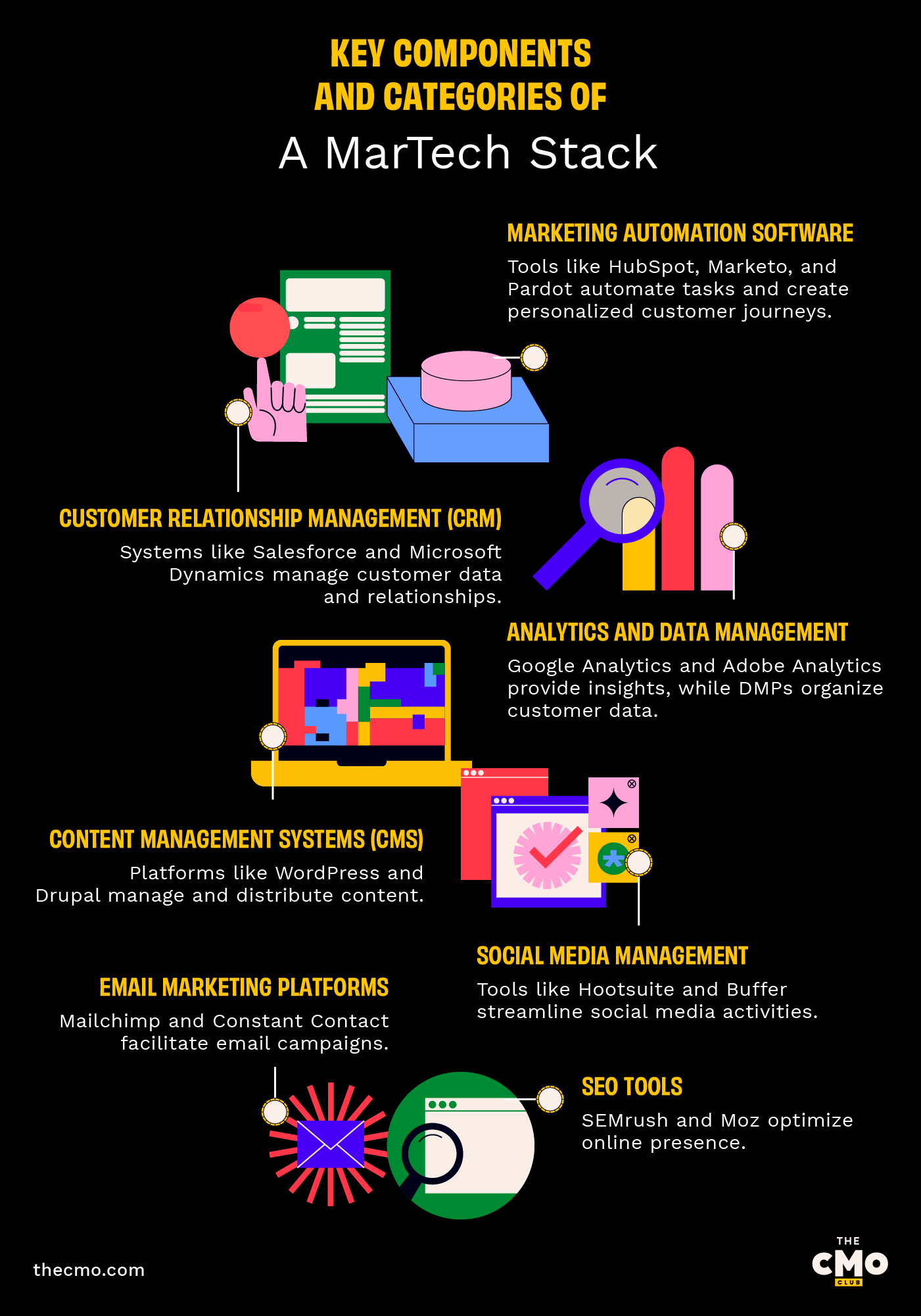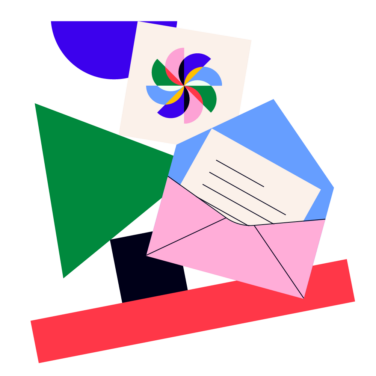One of the most significant driving forces behind modern marketing strategies is MarTech, short for Marketing Technology. In fact, 68% of CMOs agree that marketing technology is at the heart of their organization’s marketing strategy, and that its use is critical for meeting customer expectations.
In this comprehensive guide, we’ll explore what MarTech is, why understanding its origins is key to answering the what counts as marketing software question, how it differs from AdTech (Advertising Technology), and why it is indispensable for contemporary businesses. We'll dive into its key components, real-world case studies, challenges, and future trends that are reshaping marketing today.
What Is MarTech (Marketing Technology)?
Marketing Technology, or MarTech, refers to the array of marketing software, tools, and technologies used to optimize, execute, and measure marketing campaigns and initiatives. These technologies are designed to optimize marketing operating models, enhance efficiency, leverage data-driven insights, and ultimately drive better results.
MarTech encompasses a wide range of software and platforms, from marketing automation software and marketing CRMs to analytics software and social media management platforms.
Historical Perspective
To appreciate the significance of the MarTech landscape today, it's essential to understand its historical roots. The concept of using technology in marketing has been around for decades, with the first use of computers in marketing dating back to the 1960s.
However, the term "MarTech" gained prominence in the early 21st century as digital marketing and the internet revolutionized the industry. With the proliferation of online channels, businesses recognized the need for specialized tools to navigate this new marketing landscape.
Today, MarTech solutions have evolved into an estimated $500+ billion industry that continues to expand and shape the way companies engage with their customers.
Martech vs AdTech: The Difference
Before diving deeper into MarTech, it's crucial to distinguish it from AdTech. While both are integral to the modern marketing ecosystem, they serve different purposes.
MarTech primarily focuses on the overall marketing strategy and the tools and technologies required to execute it. This includes managing customer data, creating and distributing content, automating marketing workflows, and analyzing campaign performance.
AdTech, on the other hand, is more narrowly focused on advertising and the technologies used to display and target ads. AdTech involves real-time bidding, ad networks, and ad exchanges to reach potential customers through digital advertising channels such as Google Ads.
Understanding The Importance Of Marketing Technology In Your Marketing Strategy
With the world moving at an ever faster pace, adopting MarTech is not just an option, but a necessity. Martech now accounts for 30% of marketing budgets, up from 24% in 2022.
Efficiency and Productivity Gains
Efficiency is a cornerstone of modern marketing, and MarTech plays a pivotal role in achieving it.
Automating for Accuracy and Consistency
Harness MarTech to automate marketing tasks, ensuring every campaign is executed with precision and uniformity.
- Task Automation: MarTech solutions like automation software are revolutionizing how marketing teams operate by taking over repetitive tasks such as email campaigns, social media scheduling, and lead nurturing processes.
- Resource Reallocation: With these tasks automated, your team can redirect their focus to strategy and creative endeavors, ensuring that human intelligence is used where it's most impactful.
Curious about real-world marketing automation success? Learn how Derek Boshkov leverages it for efficiency
Reducing Manual Effort and Error
Implement automation to minimize the labor-intensive aspects of marketing.
- Minimizing Human Error: By automating routine tasks, MarTech significantly reduces the chances of human error, ensuring a more consistent and reliable marketing output.
- Consistency Across Campaigns: Consistent messaging and campaign execution are easier to maintain with automation, leading to a stronger brand presence and customer trust.
Leveraging Marketing Automation Software
Marketing automation software is transformative when personalizing customer interactions and scaling marketing operations efficiently.
Personalized Customer Journeys
Marketing automation platforms craft unique experiences that resonate with each customer, fostering deeper engagement and loyalty.
- Customized Experiences: Utilize platforms like HubSpot and Marketo to craft tailored customer journeys that respond to individual actions and preferences, enhancing engagement and conversion rates.
- Targeted Communications: Implement trigger-based communications to send the right message at the right time, increasing relevance and impact.
Optimizing Workflows for Scale
The strategic optimization of marketing workflows enable businesses to expand their reach without proportionally increasing their resource investment.
- Efficiency at Scale: Marketing automation tools empower businesses to amplify their marketing efforts without proportionally increasing staff, by optimizing workflows and improving operational efficiency.
- Growth Enablement: These tools are not just supportive but essential for scaling operations, driving growth, and maintaining a competitive edge in the market.
By integrating MarTech into your marketing strategy, you unlock the potential for not only significant efficiency gains but also for a more robust, error-resistant marketing ecosystem that can grow with your business needs.
Data-Driven Decision Making
Data is everything, everywhere, all at once. MarTech equips marketers with the tools to harness the data and transform it into actionable insights. By leveraging analytics tools and data management software, companies can gain a deeper understanding of their audience, track user behavior, and measure the effectiveness of marketing campaigns.
Data-driven decision making allows marketers to refine their strategies, allocate resources more efficiently, and personalize customer experiences. Moreover, it empowers them to adapt quickly to changing market dynamics and consumer preferences.
Improved Customer Experience
Customer experience has become a key differentiator in today's market. MarTech enables businesses to create personalized and tailored experiences for their customers. Content management systems (CMS), for instance, facilitate the creation and distribution of relevant content to different segments of the audience.
Social media management software and email marketing platforms allow for targeted communication and engagement with customers. By understanding individual preferences and behavior, businesses can deliver content and offers that resonate with their audience, leading to higher customer satisfaction and loyalty.
Measuring ROI and Campaign Effectiveness
Proving the ROI of marketing activities has long been a challenge for businesses. MarTech addresses this issue by providing tools for attribution modeling, A/B testing, and optimization. These capabilities allow marketers to track the performance of each marketing channel and campaign, attributing conversions and revenue to specific activities.
Accurate measurement of ROI enables companies to allocate their marketing budgets strategically, focusing on channels and tactics that yield the best results. It also empowers marketers to make data-backed decisions and refine their strategies for maximum impact.
Key Components and Categories Of A MarTech Stack
A MarTech stack is the collection of technologies and marketing tools that a business uses to facilitate its marketing efforts. The specific components of a MarTech stack can vary depending on the organization's goals and needs, but typically you’ll always see a few key items.
The most commonly used by 50% of CMOs was a dedicated CRM system, followed by data analytics tools (28.13%), with other popular tool types being data modeling, and email marketing platforms. Let’s get into them!
1. Marketing Automation Software
MarTech software that automates, like HubSpot, Marketo, and Pardot, are at the core of many stacks. These tools enable marketers to automate repetitive tasks, create personalized customer journeys, and nurture leads through the sales funnel. They often integrate with marketing CRM systems to ensure seamless communication and data sharing between marketing and sales teams.
2. Customer Relationship Management Systems (CRM)
Marketing CRMs, such as Salesforce and Microsoft Dynamics, are essential for managing customer data and building strong relationships. They provide a centralized repository for customer information, allowing businesses to track interactions, segment audiences, and tailor their marketing efforts.
3. Analytics and Data Management Software
Marketing analytics tools, such as Google Analytics and Adobe Analytics, provide insights into website traffic, user behavior, and conversion rates. Data management platforms (DMPs) help aggregate and organize customer data from various sources, enabling more precise targeting and personalization.

4. Content Management Systems (CMS)
CMS platforms like WordPress, Drupal, and Joomla simplify the creation, management, and distribution of content. They enable marketers to publish blog posts, landing pages, and other content marketing initiatives efficiently.
5. Social Media Management Software
Social media management tools like Hootsuite and Buffer streamline the process of scheduling posts, monitoring social channels, and engaging with audiences across various social platforms.
6. Email Marketing Platforms
Email marketing remains a potent channel for customer communication. Email marketing platforms like Mailchimp, Constant Contact, and SendinBlue facilitate email campaign creation, automation, and tracking.
7. Search Engine Optimization (SEO) Tools
SEO tools, such as SEMrush and Moz, help businesses optimize their online presence by conducting keyword research, monitoring rankings, and analyzing website performance.
MarTech in Action: Case Studies to Note
Airbnb
Challenge: Airbnb wanted to increase bookings on their platform.
Solution: Airbnb implemented machine learning (ML) algorithms and predictive analytics to analyze user behavior and preferences. Airbnb serves approximately 10 million requests a day and processes one million search queries. By analyzing the data through algorithms, Airbnb is able to quickly recommend relevant listings to users, improving the customer experience and increasing bookings.
Additionally, Airbnb uses machine learning to optimize pricing for hosts. By analyzing market trends and demand, their algorithms recommend optimal pricing for listings, ensuring hosts get the best possible return on their investment! They call this AI-powered pricing technology “Smart Pricing”. If a host prices their listings within 5% of the suggested price by the price tip feature - the probability of them getting a booking increases times 4.
Sephora
Challenge: Sephora aimed to enhance the in-store and in-app shopping experience.
Solution: Sephora deployed MarTech tools that combined the digital and physical shopping worlds. Starting with Sephora Virtual Artist. It was developed in partnership with AR company ModiFace. You scan your face and the system automatically recognizes the most compatible shade and recommends products through the use of an AI engine. You are even able to try the products on to see how it looks on you!
Then came Color IQ. This technology is a machine learning driven in-store product that scans a customer’s skin and provides personalized foundation and concealer recommendations. The AR tool was upgraded to use an algorithm that evaluates the customer against 10k-plus skin tones, suitable across all shade ranges, to get them the perfect shade.
In addition, the Sephora app tracks customers' purchase history and preferences, enabling personalized product recommendations and promotions in-store. The use of MarTech not only improved customer experience, but also drove increased sales, an increase of online make-up sales by 35% with the Virtual Artist feature!
Domino's Pizza
Challenge: Domino's wanted to make it easier for their customers to order pizza and boost their digital sales.
Solution: The pizza chain leveraged MarTech to launch the "Domino's AnyWare" campaign! Through various channels in their marketing technology stack, including their website, mobile app, and even social media platforms like Twitter and Facebook Messenger, customers could place orders using a wide range of communication methods. Customer’s could even order with a tweet, Ford Sync, smart televisions and smart watches!
The AnyWare campaign generated 2 billion earned media impressions, including segments on Jimmy Fallon, Ellen and the Today Show. The multi-channel approach, powered by MarTech, helped Domino's achieve and exceed its goal of having 50% of all orders be made digitally.
Challenges And Considerations
While MarTech offers numerous benefits, it can come with its fair share of challenges that businesses must address. If the challenges aren’t addressed, you risk wasting money on a MarTech stack you don’t use! Don’t be one of the professionals who only use 58% of their marketing stack’s full capabilities.
Integration Hurdles
Organizations can struggle with integrating different MarTech tools seamlessly. Siloed data and disconnected systems can hinder the flow of information and prevent businesses from gaining a holistic view of their customers. To overcome this challenge, companies should invest in solutions that enable data interoperability and integration.
Data Privacy and Security Concerns
MarTech relies heavily on data so ensuring the privacy and security of customer information is paramount. Compliance with data protection regulations, such as GDPR and CCPA, is essential. Businesses must implement robust security measures to safeguard sensitive data and build trust with customers.
The Need for Skilled Professionals
Effective utilization of MarTech requires skilled team members who can navigate complex tools, analyze data, and derive actionable insights. Companies may need to invest in training or hire professionals in MarTech jobs with expertise in marketing technology to maximize its potential.
Scalability
Businesses experiencing growth must make sure that their tech stack can scale with them. It’s crucial to be able to accommodate an expanding customer base, increasing data volumes, and evolving marketing needs.
Future Trends In MarTech And Digital Marketing
Artificial Intelligence and Machine Learning
AI and machine learning are becoming integral to MarTech, enabling marketers to analyze vast datasets, predict consumer behavior, and personalize marketing efforts at scale. Chatbots and AI-powered personalization are already transforming customer interactions. 26% of organizations are using AI for marketing and sales, and 22% are already using conversational AI or virtual assistants
Predictive Analytics and AI-Powered Personalization
Predictive analytics tools use historical data to forecast future trends and consumer behavior accurately. AI-powered personalization goes beyond basic segmentation, allowing businesses to deliver highly individualized content and recommendations. With 64% of consumers being open to purchasing a new product recommended by generative AI, it’s worth taking a chance on.
The Role of Blockchain in Marketing Technology
Blockchain technology is gaining traction in marketing for its potential to enhance data security, transparency, and trust. Because data transmitted using blockchain is encrypted, it’s more secure than the typical username and password security. One of the worst things for customer trust is hearing there’s been a data breach at a company. With your customer data platforms held in blockchain, there’s virtually no risk of that happening!
So, What Do We Think?
All around, MarTech is a game-changer. When used correctly, it can empower businesses to enhance efficiency, make data-driven decisions, improve customer experiences, and measure ROI effectively. And as technology continues to change by the day, MarTech is poised to become only more essential in staying competitive and relevant. In order to stay on top of it all, be sure to attend one of our recommended MarTech conferences.
Join the conversation on social media and connect with us on LinkedIn to share your thoughts and experiences with MarTech, and don't hesitate to leave a comment below! While you’re here, you can also subscribe to our newsletter to get tips and tricks straight to your inbox.
You Might Also Like: 15 Emerging MarTech Startups To Watch In 2025


